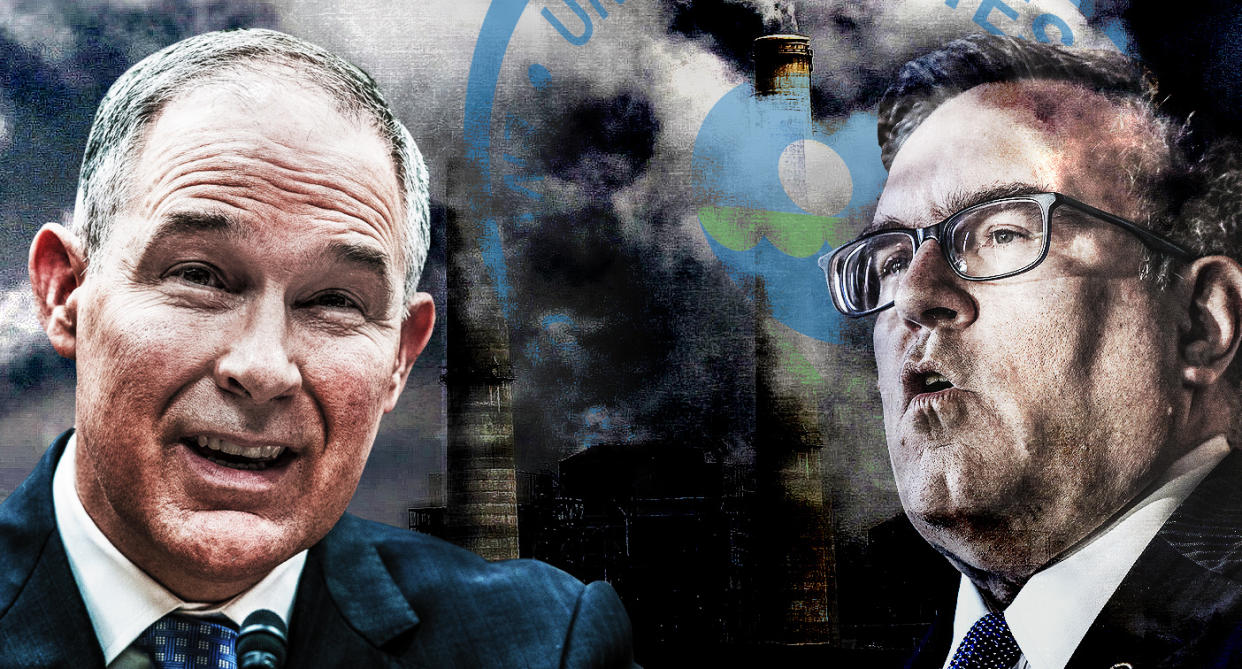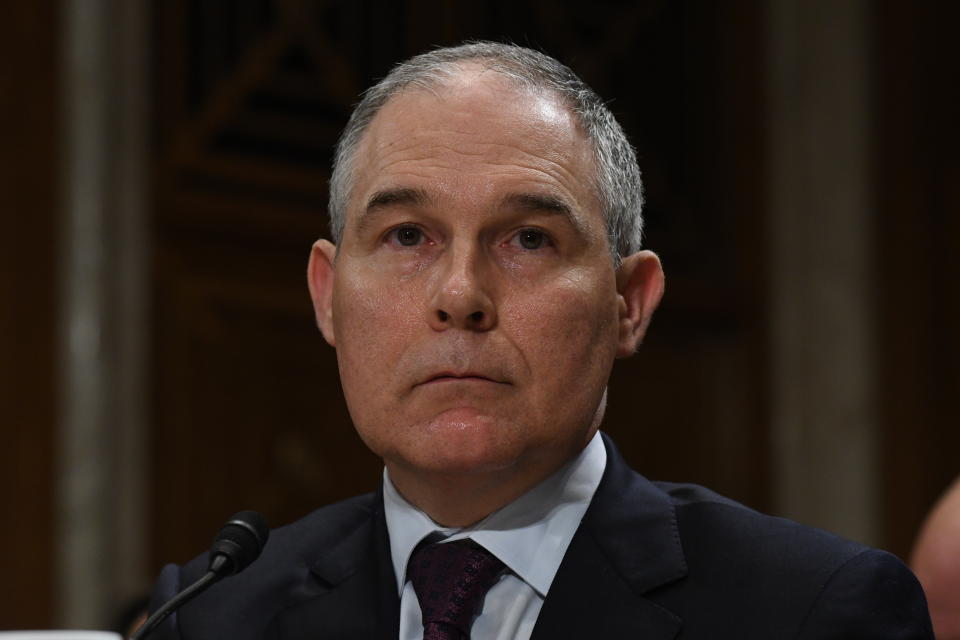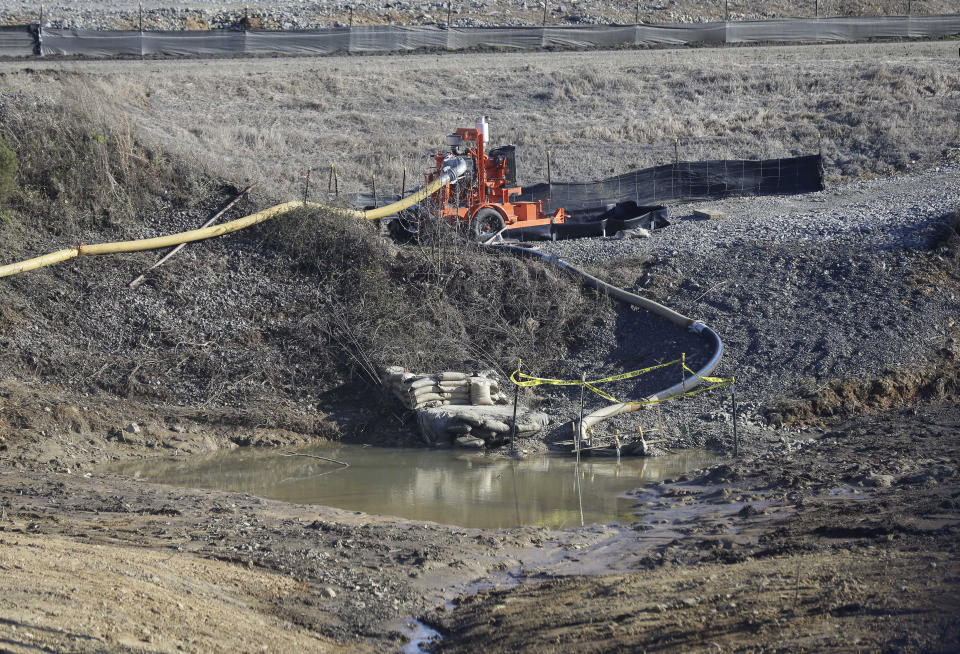New EPA chief's first moves show he's following Pruitt's agenda, without the sirens

Following the chaotic tenure of Scott Pruitt, the new acting administrator of the Environmental Protection Agency (EPA), Andrew Wheeler, is trying to bring more competence and transparency to the job, but all signs indicate he’s continuing to carry out President Trump’s assault on regulations.
Wheeler, unlike Pruitt, is a longtime insider who understands the machinations of Washington. He’s unlikely to unilaterally overturn environmental protections the way Pruitt did, and more likely to dismantle them slowly through the appropriate channels. Wheeler’s know-how and political sophistication suggest he will be less vulnerable to lawsuits and less prone to gross ethical violations — meaning he could be far more successful.
“Whereas Pruitt was careless and hasty and made dozens of mistakes, if not more, Wheeler as a polished lobbyist, well connected on K Street, well connected on the Hill, has the potential of being very dangerous. He won’t be as careless and sloppy as his predecessor,” Melinda Pierce, the legislative director for the Sierra Club, told Yahoo News.
Andrew Rosenberg, director of the Center for Science and Democracy at the Union of Concerned Scientists, said Wheeler is much smoother in how he presents the EPA publicly and even to his own employees.
“Pruitt came in saying, ‘We know the EPA is a terrible place, and I’m going to fix it all,’ and he didn’t really buy into the mission. I think there’s more finesse in Mr. Wheeler, but I don’t think his actual policy agenda is any different,” Rosenberg told Yahoo News.
Wheeler, who was sworn in as the EPA’s deputy administrator in April after a heated confirmation process, was a top aide to Sen. Jim Inhofe, R-Okla., from 1995 until 2009. Inhofe was outspoken in rejecting the overwhelming scientific consensus behind anthropogenic climate change and notoriously tossed a snowball on the Senate floor as “proof” that climate change is not real. Wheeler spent 12 years on the Senate Committee on Environment and Public Works fighting government regulations on greenhouse gas emissions.

Starting in 2009, Wheeler worked for the Faegre Baker Daniels law firm in lobbying for coal producer Murray Energy, which is owned by prominent Trump supporter Robert E. Murray, and he actively opposed former President Barack Obama’s proposals to protect the environment and address climate change. He has also dismissed the U.N. Intergovernmental Panel on Climate Change’s science as politically motivated.
“Pruitt was a fiercely ambitious ‘outsider’ from Oklahoma, whereas Andrew Wheeler is a Washington, D.C., insider,” Pierce said. “Here’s a guy that’s swampy as it gets in terms of being a D.C. lobbyist insider working for K Street and a noted climate change denier.”
Wheeler was sworn in as acting head of the EPA on July 9 following Pruitt’s resignation two days earlier. He kicked off his first day at the helm with an 18-minute speech to the agency’s employees. It was essentially a charm offensive in which he went through his abridged biography. He defended his work as a coal lobbyist by emphasizing how he fought to protect the pensions and health care benefits of coal miners: “I did work for a coal company, and I’m not at all ashamed of the work I did for the coal company.”
Wheeler said the EPA has made “tremendous progress over the last year and a half” thanks to the leadership of Trump and Pruitt. Under his leadership, Wheeler continued, the EPA would continue to keep cleaning “Superfund sites” (which have been contaminated with hazardous substances), investing in the nation’s water infrastructure, improving air quality and updating the chemical safety review process.
Wheeler used much of the same language Pruitt had when he came to the EPA. Both emphasized returning to the EPA’s original mission, taking a narrower view of the agency’s responsibilities than previous administrators.

“We’re also restoring the rule of law, reining in federal regulatory overreach and refocusing EPA on its core responsibilities,” Wheeler said. “As a result, the economy is booming, and economic optimism is surging.”
To Rosenberg, Wheeler sounded more concerned about risks to industry and the economy than about risks to communities.
“[He said] that EPA needed to communicate risk. Actually, EPA needs to address and mitigate the risks to communities. That’s their job. It’s not just communicating ‘You’re about to be sick,’ or ‘There’s about to be a toxic waste explosion.’ It’s actually doing something about it,” Rosenberg said. “I was nervous he wasn’t speaking to the real mission of EPA, which is to protect public health and safety.”
Rosenberg added that most of what Pruitt touted as regulatory rollbacks were merely giveaways to the oil and gas industries. “The career professional staff, they’re the ones that have continued to try to push forward with real public health protections in spite of the administration,” he said.
Rosenberg said Wheeler has been a little more open to the press than Pruitt and less obsessed with secrecy, security and ostentatious displays of prerogatives — such as having his driver use his siren to cut through traffic on his way to a restaurant. Wheeler promised greater transparency, but neither Rosenberg nor Pierce was too impressed by these slight changes.
“That should’ve been status quo,” Pierce said. “I’m not going to give you a gold star for transparency for doing what’s expected but somehow surprising in the wake of Scott Pruitt.”
The former coal lobbyist’s first major act as EPA acting chief was to overhaul the rule for how toxic waste from the burning of coal should be disposed of at power plants around the country. It was the first of several expected revisions to Obama-era rules for handling toxic waste to avoid contaminating waterways. The Obama-era regulations were inspired in part by two disastrous coal-ash spills in Tennessee (2008) and North Carolina (2014).

“The [Obama-era] rule wasn’t as protective as the environmental and public health community wanted it to be, but it was still a huge step forward,” Becky Hammer, the deputy director of federal water policy for the Natural Resources Defense Council, told Yahoo News.
Hammer said the new standards required owners and operators of coal-ash disposal sites to publish groundwater monitoring data, but the EPA hasn’t made this information easy for anyone to find. Rather than creating a central database, the EPA is directing the public to each individual facility’s own website in order to see its data.
The Environmental Integrity Project, an environmental nonprofit, downloaded and compiled all the data from each facility’s website and determined that almost every single site — roughly 95 percent of them — identified groundwater contamination from coal ash.
Coal ash, the material left over after coal is burned for electricity, is the second largest waste stream in the country after household garbage. Coal-fired power plants produce roughly 140 million tons per year.
“There are a number of heavy metals in it that are very dangerous to human health: lead, arsenic, radium, hexavalent chromium, all kinds of things you don’t want to come into contact with under any circumstances because they’re carcinogenic, they’re neurotoxic, they’re poisonous,” Hammer said.
Coal-ash landfills are enormous, typically 120 acres with an average depth of over 40 feet, and sometimes quite close to houses.
“The problem is that about half of all the ponds and landfills don’t have any liners or safeguards to prevent this dangerous material from leaking downward into the groundwater,” Hammer said. “We already know of about 200 sites across the country where coal ash has been found to definitively taint water supplies. There are probably a lot more than that, but a lot of the older sites aren’t monitored at all.”
Hammer pointed out that an Obama-era EPA study found that people who live near coal-ash disposal sites have a one-in-50 chance of getting cancer from drinking water contaminated by arsenic, and they have increased risks of liver, kidney and lung disease.
The coal industry petitioned the EPA to reconsider the regulations, arguing that the cost of compliance was excessive and would result in significant financial loss.

“They didn’t want the cost of more secure areas. Effectively, they’re just dumping the cost onto the public by saying, ‘OK, you clean it up,’ as opposed to ‘We, the ones that created the waste, should clean it up,’” Rosenberg said.
Pruitt was sympathetic to their case and in September 2017 started the reconsideration process that Wheeler completed.
“These amendments provide states and utilities much-needed flexibility in the management of coal ash, while ensuring human health and the environment are protected,” Wheeler said in a statement. “Our actions mark a significant departure from the one-size-fits-all policies of the past and save tens of millions of dollars in regulatory costs.”
Hammer said Wheeler’s new rule allows groundwater monitoring standards to be waived and extends the deadline for facilities to close coal-ash pits that are known to be contaminating groundwater. The 2015 rule said those facilities have to close by next April, but now that deadline has been pushed back one and a half years.
“The EPA didn’t even consider what the health effects of this would be. They just didn’t look at it at all. All they considered was how much money it would save the coal industry,” Hammer said.
Sources have told Bloomberg and others that Wheeler’s EPA is preparing to roll back Obama-era emission targets for cars, which were among Obama’s major regulatory efforts to control greenhouse gases. Under Wheeler, the EPA reportedly plans to revoke California’s authority to regulate its own car emissions, which it has done since the 1950s.
Former California Gov. Arnold Schwarzenegger told Yahoo News that his state would not stand idly by while the Trump administration took away its ability to set stricter emissions standards. “We also have a long history of the federal government respecting California’s right, as a state, to regulate our own air. When I was governor, the EPA thought they could stop us, and we won. The EPA even tried to claim that greenhouse gases were not a pollutant, and we took them all the way to the Supreme Court and we won that,” Schwarzenegger said.

Sen. Tom Carper, D-Del., the top Democrat on the Environment and Public Works Committee, has taken the lead among members of Congress in calling on Wheeler to restore the trust of the American people in the EPA after Pruitt’s scandal-ridden tenure. In an open letter, Carper urged Wheeler to follow in the footsteps of former EPA Administrator William Ruckelshaus, a Republican who earned “an emotional hero’s welcome” from EPA staffers when he took over the agency (for the second time) in 1983, replacing the scandal-tarnished Anne Gorsuch. Ruckelshaus, who was also the first EPA chief, appointed by President Nixon in 1970, promised to follow environmental laws, making no “Big P” political decisions and seeking help from scientists and environmentalists.
“The damage Scott Pruitt has done to the Agency will not easily be undone,” Carper wrote. “While you and I have not always agreed, and will not always agree, on every environmental policy matter, it is my hope and expectation that you will carefully consider the lessons of the past as you prepare to chart the Agency’s future.”
Wheeler is surrounded by Pruitt’s top aides, many of whom have strong industry ties, including Richard Yamada, who worked for Texas Rep. Lamar Smith, Nancy Beck, who was an executive at the American Chemistry Council, and William Wehrum, who was an attorney for the oil and coal industries.
Under Wheeler, Rosenberg said, expect to see more or less the same goal of slashing regulations unless he gives “very strong different direction to his folks — many of whom I believe have serious conflicts of interest.”
_____
Read more from Yahoo News:
Adam Schiff: Trump the ‘gravest threat to American democracy’ he’s ever seen
Ex-NSA official: Russian hack of Democrats was ‘assembly line operation’
How the Land and Water Conservation Fund became a political football
Heat wave strikes the Arctic, and the climate enters the Twilight Zone
Photos: Violence, poverty and politics: Why Hondurans are escaping to the U.S.


